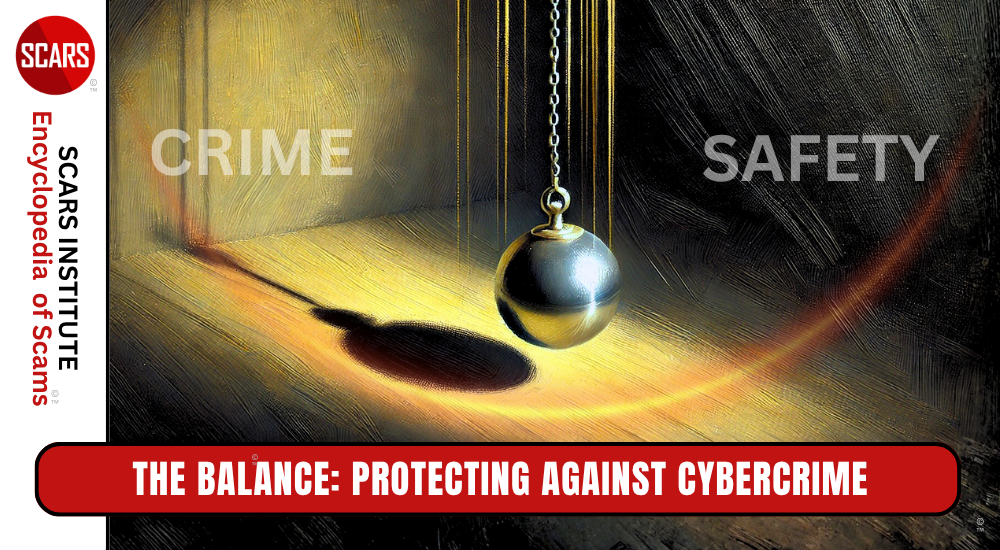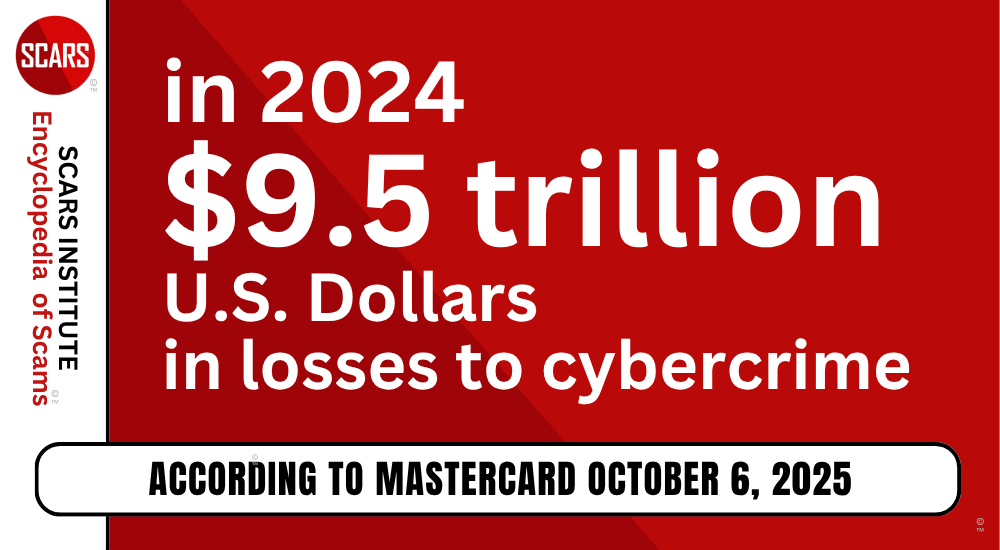
SCARS Institute’s Encyclopedia of Scams™ Published Continuously for 25 Years

An Academic Study Into West African Criminality
We present this important study to give insights into the mindset of scammers/online criminals in Ghana and by extension the rest of West Africa.
Understanding how scammers think and justify their actions from a criminology point of view is important in being able to both identify them, arrest them, and successfully convict them. That is why this study is so important to crime prevention professionals around the world.
It should be acknowledged that conducting this research inside of West Africa was not without risks to the study team and authors. We thank them for facing the dragon in his own lair!
Title:
How Do Individuals Justify and Rationalize their Criminal Behaviors in Online Romance Fraud?
Authors:
- Martin Offei
- Francis K. Andoh-Baidoo, The University of Texas Rio Grande Valley
- Emmanuel Wusuhon Yanibo Ayaburi, The University of Texas Rio Grande Valley
- David Asamoah
Institutions:
- Department of Computer Science, Koforidua Technical University, Koforidua, Ghana
- Department of Information Systems, The University of Texas Rio Grande Valley, Edinburg, TX, USA
- Department of Supply Chain and Information Systems, Kwame Nkrumah University of Science and Technology, Kumasi, Ghana
Abstract:
Online romance fraud (ORF) is a growing concern with such serious negative consequences as financial loss or suicide to the victim. Majority of empirical studies on online romance fraud using attachment, deception, protection motivation and relation theories focus on the victim. While neutralization offers insights into how individuals justify their deviant behaviors, the results have not been consistent in different contexts. In the ORF context, offenders may not only rely on justifying techniques but also rationalize their actions by denying risk both to the victim and the offender. Thus, drawing from the neutralization and denial of risk theories, we develop a research model to explain how online romance offenders justify and rationalize their intended criminal activities. To confirm our theoretical model, we collected 320 responses from individuals at Internet Cafés alleged to be online romance fraud hotspots. Our results highlight the boundary conditions of neutralization techniques in the context of online romance fraud. The study shows that denial of risk, a rationalization mechanism, moderates the relationship between denial of victim, a justification technique, and intention to commit romance fraud. This insight advances the frontiers of neutralization theory. We offer both theoretical and managerial implications of the findings.
How do Individuals justify and rationalize their criminal behaviors in online romance fraud?
From the Study.
Introduction
Rigorous academic studies of online romance fraud (ORF), especially those involving empirical evidence, are still evolving. Widely accepted theories or theoretical frameworks in the literature such as attachment theory, deception, protection motivation theory and relational theory have been used to investigate the online romance fraud phenomenon (Buchanan and Whitty 2014; Ho et al. 2017; Luu et al. 2017; Mosley et al. 2020). Much of the studies focus on the victims and their vulnerabilities. However, understanding why offenders commit such illegal acts without regard to the harm to the victims is evolving and unclear. Online romance fraud offenders use online dating and social networking sites to deceive and defraud their victims in a target nation, mostly Western countries. The offenders take advantage of the victims’ genuine quest for romantic relationships to deceive their victims through false pretense, impersonation, counterfeiting, forgery, and other fraudulent representation of facts (Ibrahim 2016). Online fraud has received attention from criminology, information systems, and other disciplines (Buchanan and Whitty 2014; Moore et al. 2009; Williams et al. 2017; Wong et al. 2012). One of the unique features of online romance fraud is that the victim is more driven by the quest for romantic relationship and not the financial reward (Buchanan and Whitty 2014). The romantic relationship distinguishes romance scam or romance fraud from any other fraud and for that matter, any other cybercrimes, and therefore demands special attention (Cross 2018). Illegal activities of deceit or extortion of individuals on the dating sites is aided by the ability of the perpetrators to justify their actions due to the way dating sites operate. A troubling aspect of the online romance fraud is that, most of the offenders reside in jurisdictions outside that of the victims. Most perpetrators are usually technically savvy and about college-aged.
In this study, we investigate how individuals employ neutralization techniques to justify online romance fraud prior to committing the crime (Sykes and Matza 1957). Neutralization theory, from criminology, has been employed to explain deviant behaviors in societies and organizations. In proposing the neutralization theory, Sykes and Matza (1957) suggest that, deviants do not generally oppose the law-abiding society but find ways to convince the society that their deviant behavior results from treatment and harm that they have suffered from their environment. They put across a sorry and apologetic disposition to gain sympathy and shield themselves from blame from the society. Sykes and Matza (1957) refer to these actions as neutralization techniques which are learned by deviants and used as the basis for legitimizing their crimes or victims. A neutralization technique is a temporary insulator that a criminal or an offender uses to absolve themselves from self-blame and from the blame of society in general (Sykes and Matza 1957).
Neutralization techniques as justifications are critical in lessening the effectiveness of social controls. Characteristics of the perpetrators where neutralization may explain delinquent behavior include: 1) feeling of shame or guilt 2) identification of appropriate and inappropriate target 3) avoiding harm to any individual within their community and 4) accepting at least partially dominant social order (Sykes and Matza 1957). It behooves academia and the society in general to understand why an abled college-age individual who might otherwise aspire to productive socially acceptable careers engage in such delinquent behavior as ORF. Our first research question: (i) how does neutralization influence the intention to commit online romance fraud?
This study acknowledges that neutralization techniques alone may not be enough to explain intention to commit crime, since other factors may be at play (Siponen et al. 2012). While neutralization is the basis for forming justifications prior to committing a crime, rationalization can be deployed to masquerade the main motivation after committing the crime.
Rationalization is aimed at making a case for why the actions make sense. In the context of online romance, victim, and offender establish a relationship in which the offender commits time, effort, and in some cases monetary gifts into maintaining the relationship. The victim equally invests same if not more. However, the offenders know ahead of committing the crime that online romance fraud is not only illegal but also has heavy negative consequences. Thus, offenders may rationalize their actions by denying the existence of risk through their confidence in evading law enforcement or that their specific crime is not as bad or harmful as other crimes. Therefore, we postulate that denial of risk perception may interact with the effect of neutralization on intention to commit crime. To address the need to understand the motivation of online romance offender, we focus on the effect of denial of risk and address our second research question: (2) how does denial of risk perception interact with the effect of neutralization on the intention to commit online romance fraud?
Drawing from the neutralization theory (Sykes and Matza 1957) and denial of risk theory (Peretti-Watel 2003), we develop a research model that explains how online romance scammers justify and rationalize their criminal activities.
To empirically test our model, we collected 320 responses from individuals at Internet Cafés alleged to be online romance fraud hotspots. The study results contribute to the cyber fraud literature by complementing the existing criminology theories used to understand deviant behaviors. While prior research has identified the positive effect of denial of responsibility, denial of injury, and denial of victim, a subset of the neutralization techniques, on intention to commit crime, this study finds that their positive effects vary depending on the offender level of denial of risk perception. Thus, this study contributes to building theory about ORF phenomenon and providing boundaries to the neutralization theory. For practical implication, our results show that it may be useful for administrators of online platforms to provide their members at the point of joining the platform information that contains such pointers as levels of over-confidence levels or empathy about of their potential partners. Such pointers illustrate the tendencies to justify or rationalize delinquent intentions. The rest of the paper is organized as follows. We present theoretical development and research model highlighting some of the prior relevant studies in the next section. We then discuss our research method in section 3, followed by section 4, which covers our results, findings, and implications.
[pdf-embedder url=”https://romancescamsnow.com/wp-content/uploads/2021/11/How-Do-Individuals-Justify-and-Rationalize-their-Criminal-Behavio.pdf” title=”How Do Individuals Justify and Rationalize their Criminal Behavio”]
-/ 30 /-
What do you think about this?
Please share your thoughts in a comment below!
Table of Contents
- An Academic Study Into Criminal Behavior In West Africa
- We present this important study to give insights into the mindset of scammers/online criminals in Ghana and by extension the rest of West Africa.
- How do Individuals justify and rationalize their criminal behaviors in online romance fraud?
- Introduction
LEAVE A COMMENT?
Recent Comments
On Other Articles
- Arwyn Lautenschlager on Love Bombing And How Romance Scam Victims Are Forced To Feel: “I was love bombed to the point that I would do just about anything for the scammer(s). I was told…” Feb 11, 14:24
- on Dani Daniels (Kira Lee Orsag): Another Scammer’s Favorite: “You provide a valuable service! I wish more people knew about it!” Feb 10, 15:05
- on Danielle Delaunay/Danielle Genevieve – Stolen Identity/Stolen Photos – Impersonation Victim UPDATED 2024: “We highly recommend that you simply turn away form the scam and scammers, and focus on the development of a…” Feb 4, 19:47
- on The Art Of Deception: The Fundamental Principals Of Successful Deceptions – 2024: “I experienced many of the deceptive tactics that romance scammers use. I was told various stories of hardship and why…” Feb 4, 15:27
- on Danielle Delaunay/Danielle Genevieve – Stolen Identity/Stolen Photos – Impersonation Victim UPDATED 2024: “Yes, I’m in that exact situation also. “Danielle” has seriously scammed me for 3 years now. “She” (he) doesn’t know…” Feb 4, 14:58
- on An Essay on Justice and Money Recovery – 2026: “you are so right I accidentally clicked on online justice I signed an agreement for 12k upfront but cd only…” Feb 3, 08:16
- on The SCARS Institute Top 50 Celebrity Impersonation Scams – 2025: “Quora has had visits from scammers pretending to be Keanu Reeves and Paul McCartney in 2025 and 2026.” Jan 27, 17:45
- on Scam Victims Should Limit Their Exposure To Scam News & Scammer Photos: “I used to look at scammers photos all the time; however, I don’t feel the need to do it anymore.…” Jan 26, 23:19
- on After A Scam, No One Can Tell You How You Will React: “This article was very informative, my scams happened 5 years ago; however, l do remember several of those emotions and/or…” Jan 23, 17:17
- on Situational Awareness and How Trauma Makes Scam Victims Less Safe – 2024: “I need to be more observant and I am practicing situational awareness. I’m saving this article to remind me of…” Jan 21, 22:55
ARTICLE META
Important Information for New Scam Victims
- Please visit www.ScamVictimsSupport.org – a SCARS Website for New Scam Victims & Sextortion Victims
- Enroll in FREE SCARS Scam Survivor’s School now at www.SCARSeducation.org
- Please visit www.ScamPsychology.org – to more fully understand the psychological concepts involved in scams and scam victim recovery
If you are looking for local trauma counselors please visit counseling.AgainstScams.org or join SCARS for our counseling/therapy benefit: membership.AgainstScams.org
If you need to speak with someone now, you can dial 988 or find phone numbers for crisis hotlines all around the world here: www.opencounseling.com/suicide-hotlines
A Note About Labeling!
We often use the term ‘scam victim’ in our articles, but this is a convenience to help those searching for information in search engines like Google. It is just a convenience and has no deeper meaning. If you have come through such an experience, YOU are a Survivor! It was not your fault. You are not alone! Axios!
A Question of Trust
At the SCARS Institute, we invite you to do your own research on the topics we speak about and publish, Our team investigates the subject being discussed, especially when it comes to understanding the scam victims-survivors experience. You can do Google searches but in many cases, you will have to wade through scientific papers and studies. However, remember that biases and perspectives matter and influence the outcome. Regardless, we encourage you to explore these topics as thoroughly as you can for your own awareness.
Statement About Victim Blaming
SCARS Institute articles examine different aspects of the scam victim experience, as well as those who may have been secondary victims. This work focuses on understanding victimization through the science of victimology, including common psychological and behavioral responses. The purpose is to help victims and survivors understand why these crimes occurred, reduce shame and self-blame, strengthen recovery programs and victim opportunities, and lower the risk of future victimization.
At times, these discussions may sound uncomfortable, overwhelming, or may be mistaken for blame. They are not. Scam victims are never blamed. Our goal is to explain the mechanisms of deception and the human responses that scammers exploit, and the processes that occur after the scam ends, so victims can better understand what happened to them and why it felt convincing at the time, and what the path looks like going forward.
Articles that address the psychology, neurology, physiology, and other characteristics of scams and the victim experience recognize that all people share cognitive and emotional traits that can be manipulated under the right conditions. These characteristics are not flaws. They are normal human functions that criminals deliberately exploit. Victims typically have little awareness of these mechanisms while a scam is unfolding and a very limited ability to control them. Awareness often comes only after the harm has occurred.
By explaining these processes, these articles help victims make sense of their experiences, understand common post-scam reactions, and identify ways to protect themselves moving forward. This knowledge supports recovery by replacing confusion and self-blame with clarity, context, and self-compassion.
Additional educational material on these topics is available at ScamPsychology.org – ScamsNOW.com and other SCARS Institute websites.
Psychology Disclaimer:
All articles about psychology and the human brain on this website are for information & education only
The information provided in this article is intended for educational and self-help purposes only and should not be construed as a substitute for professional therapy or counseling.
While any self-help techniques outlined herein may be beneficial for scam victims seeking to recover from their experience and move towards recovery, it is important to consult with a qualified mental health professional before initiating any course of action. Each individual’s experience and needs are unique, and what works for one person may not be suitable for another.
Additionally, any approach may not be appropriate for individuals with certain pre-existing mental health conditions or trauma histories. It is advisable to seek guidance from a licensed therapist or counselor who can provide personalized support, guidance, and treatment tailored to your specific needs.
If you are experiencing significant distress or emotional difficulties related to a scam or other traumatic event, please consult your doctor or mental health provider for appropriate care and support.
Also read our SCARS Institute Statement about Professional Care for Scam Victims – click here to go to our ScamsNOW.com website.


![How Do Individuals Justify and Rationalize their Criminal Behaviors in Online Romance Fraud? [PDF] psychological and emotional abuse psychological-and-emotional-abuse](https://romancescamsnow.com/wp-content/uploads/2021/11/psychological-and-emotional-abuse.png)
![How Do Individuals Justify and Rationalize their Criminal Behaviors in Online Romance Fraud? [PDF] 4 Quick Clues To Spot A Romance Scam 4 Quick Clues For Spotting Romance Scams](https://romancescamsnow.com/wp-content/uploads/2021/11/4-Quick-Clues-To-Spot-A-Romance-Scam.png)
![How Do Individuals Justify and Rationalize their Criminal Behaviors in Online Romance Fraud? [PDF] Justify and Rationalize their Criminal Behaviors Justify and Rationalize their Criminal Behaviors](https://romancescamsnow.com/wp-content/uploads/2021/11/Justify-and-Rationalize-their-Criminal-Behaviors.png)
![How Do Individuals Justify and Rationalize their Criminal Behaviors in Online Romance Fraud? [PDF] come and join 2 SCARS Institute Scam Survivor's Community portal banner](https://romancescamsnow.com/wp-content/uploads/2025/12/come-and-join-2.png)






![How Do Individuals Justify and Rationalize their Criminal Behaviors in Online Romance Fraud? [PDF] SCARS CDN REPORT SCAMEMRS HERE e1697414569935 SCARS-CDN-REPORT-SCAMEMRS-HERE](https://romancescamsnow.com/wp-content/uploads/2018/12/SCARS-CDN-REPORT-SCAMEMRS-HERE-e1697414569935.png?_t=1697414571)
![How Do Individuals Justify and Rationalize their Criminal Behaviors in Online Romance Fraud? [PDF] NavyLogo@4x 81 U.S. & Canada Suicide Lifeline 988](https://romancescamsnow.com/wp-content/uploads/2023/06/NavyLogo@4x-81.png)

![How Do Individuals Justify and Rationalize their Criminal Behaviors in Online Romance Fraud? [PDF] niprc1.png1 150x1501 11 How Do Individuals Justify and Rationalize their Criminal Behaviors in Online Romance Fraud? [PDF] niprc1.png1 150x1501 11](https://scamsnow.com/wp-content/uploads/2025/04/niprc1.png1_-150x1501-11.webp)
Thank you for your comment. You may receive an email to follow up. We never share your data with marketers.